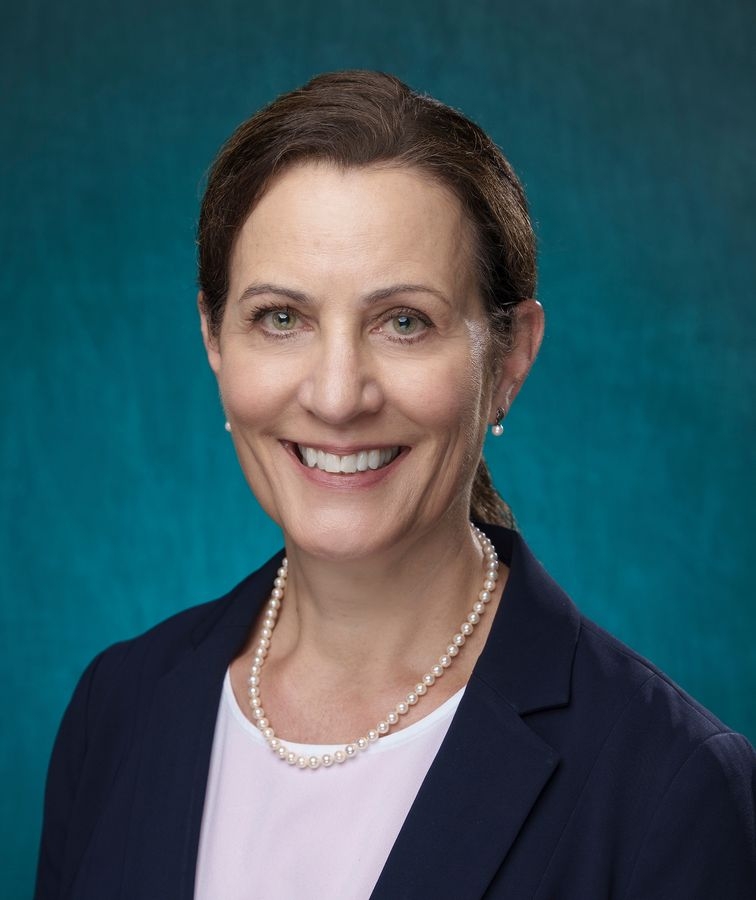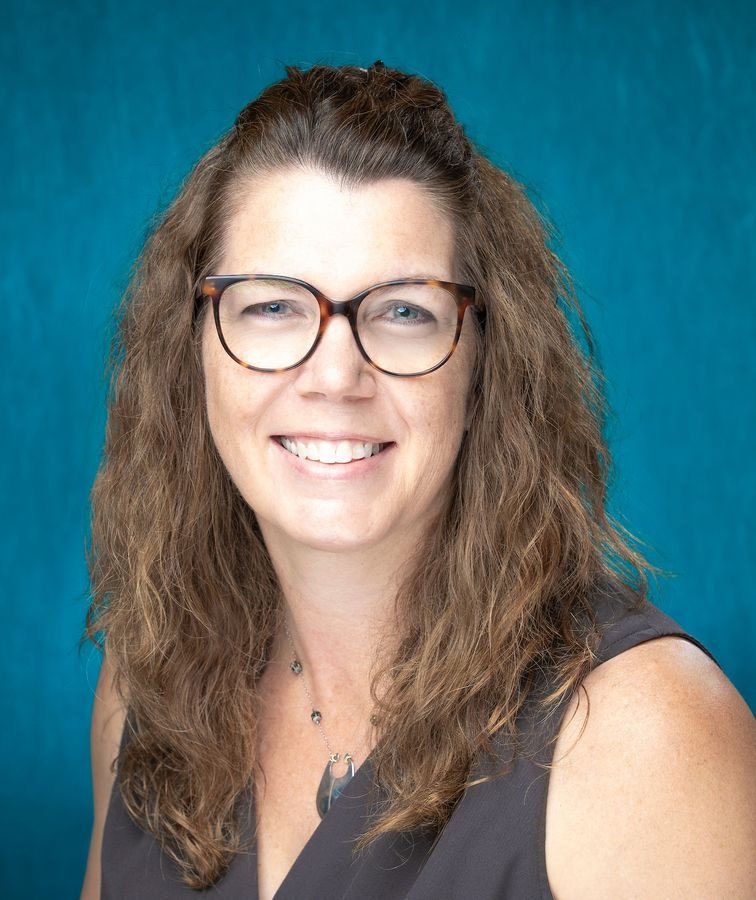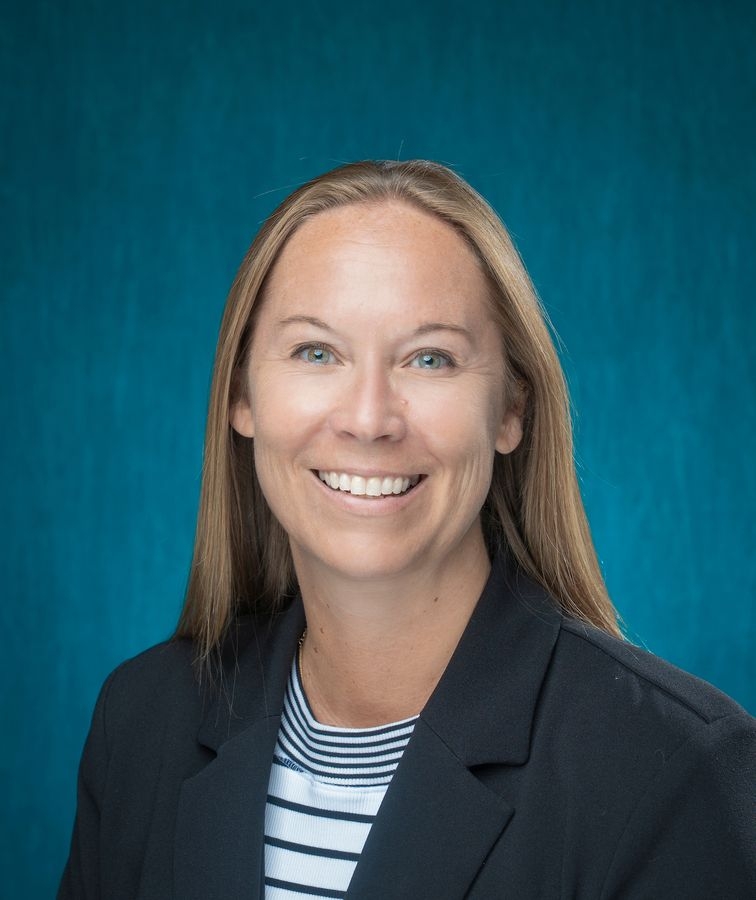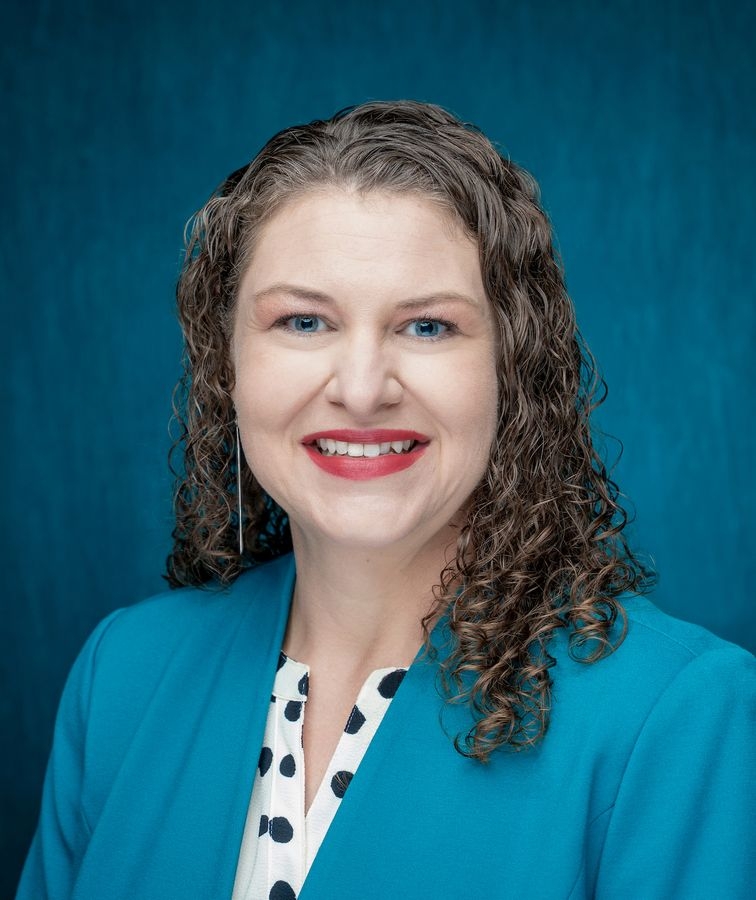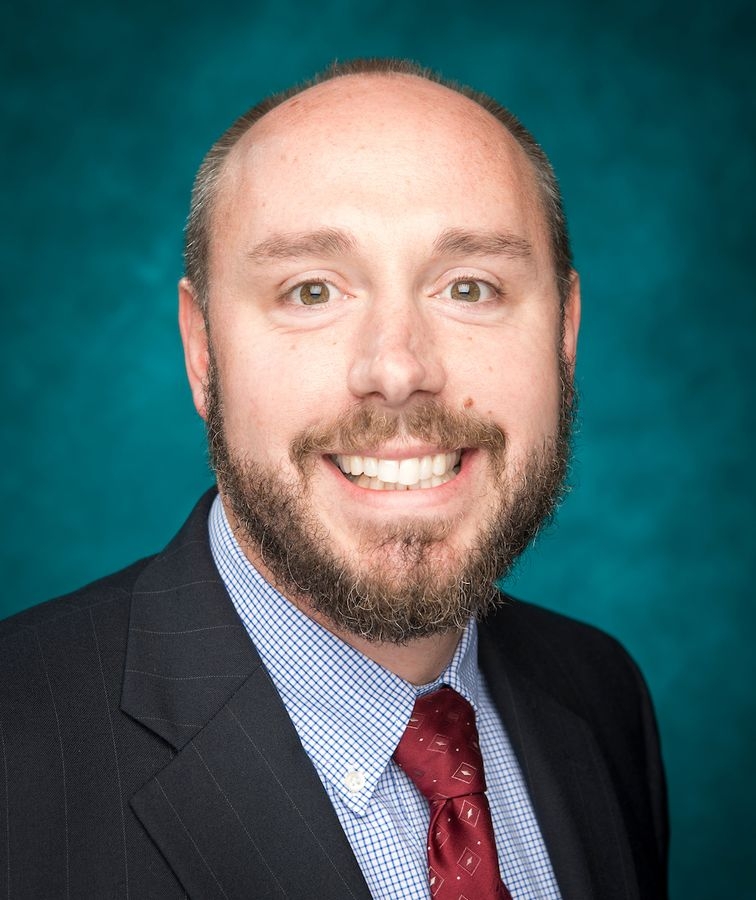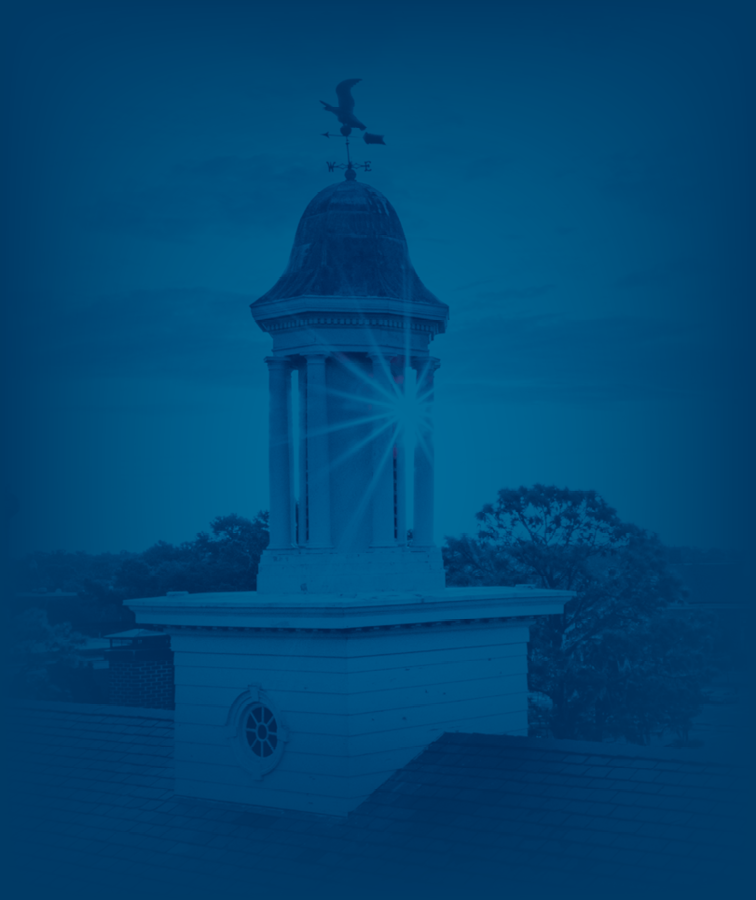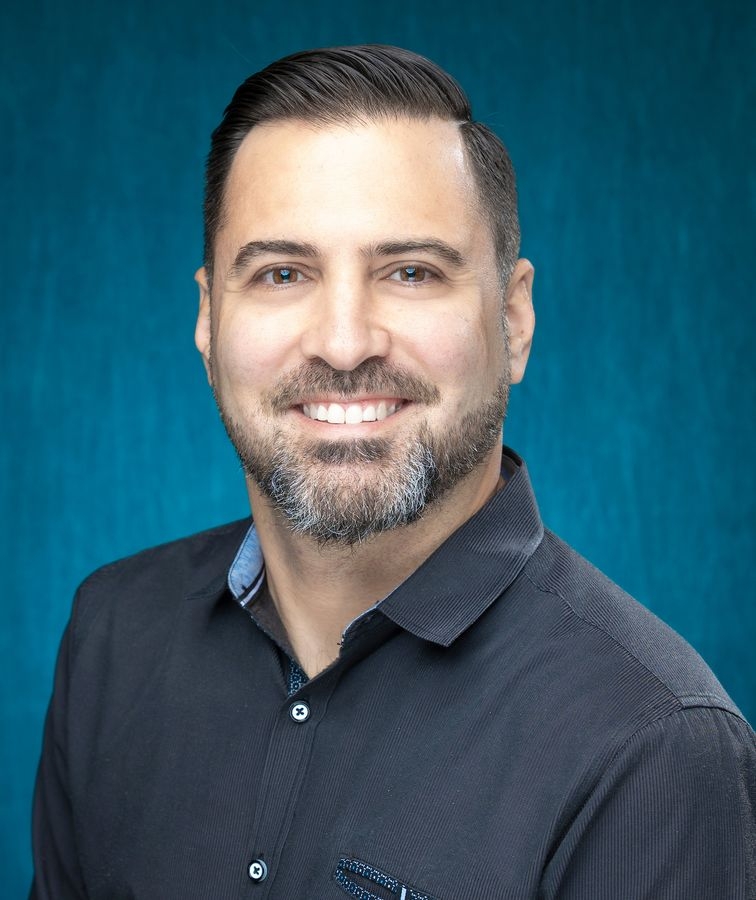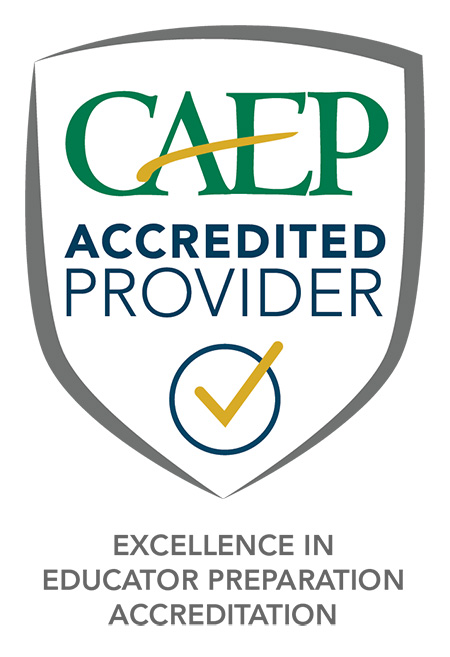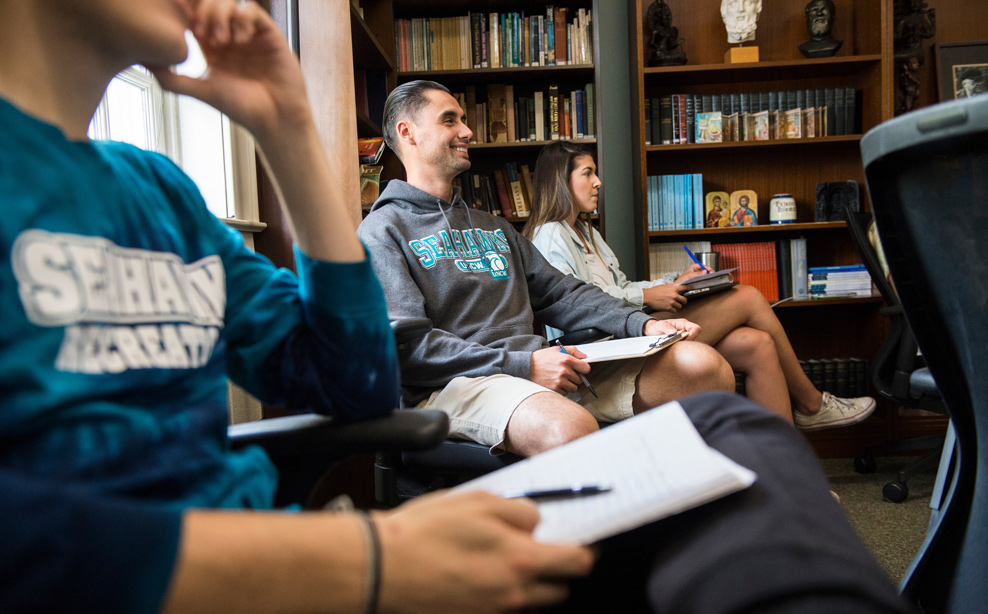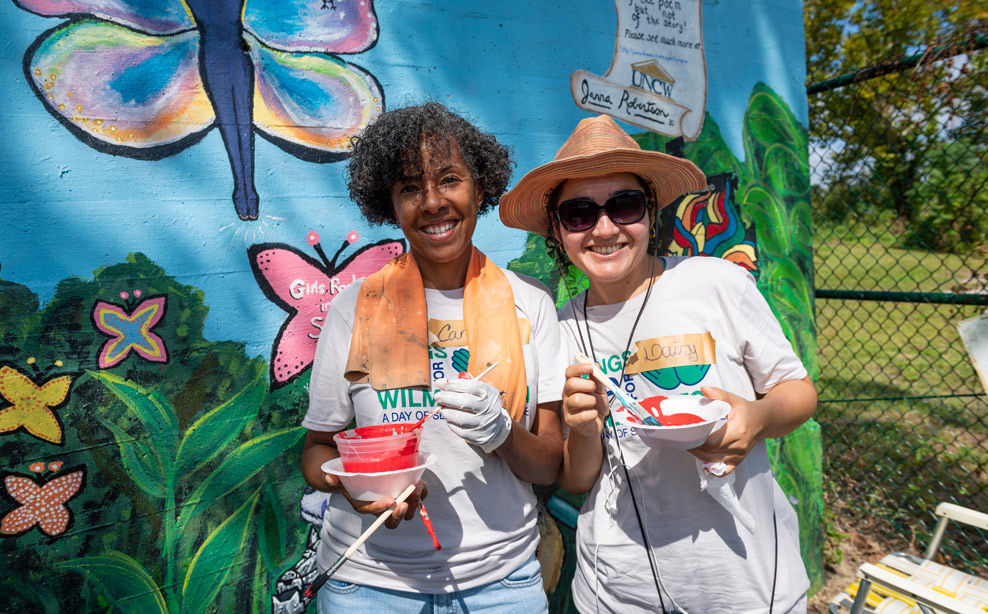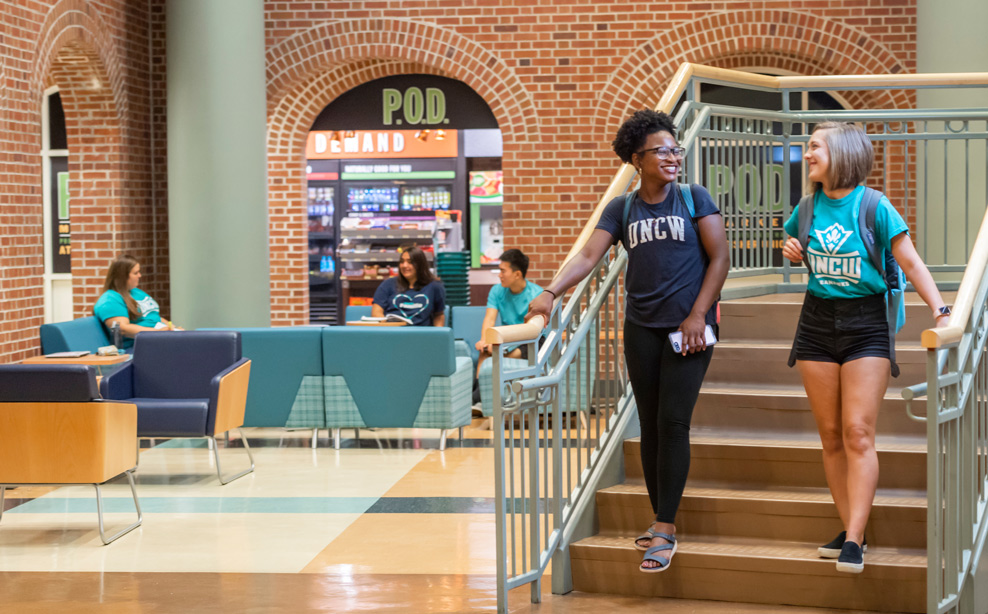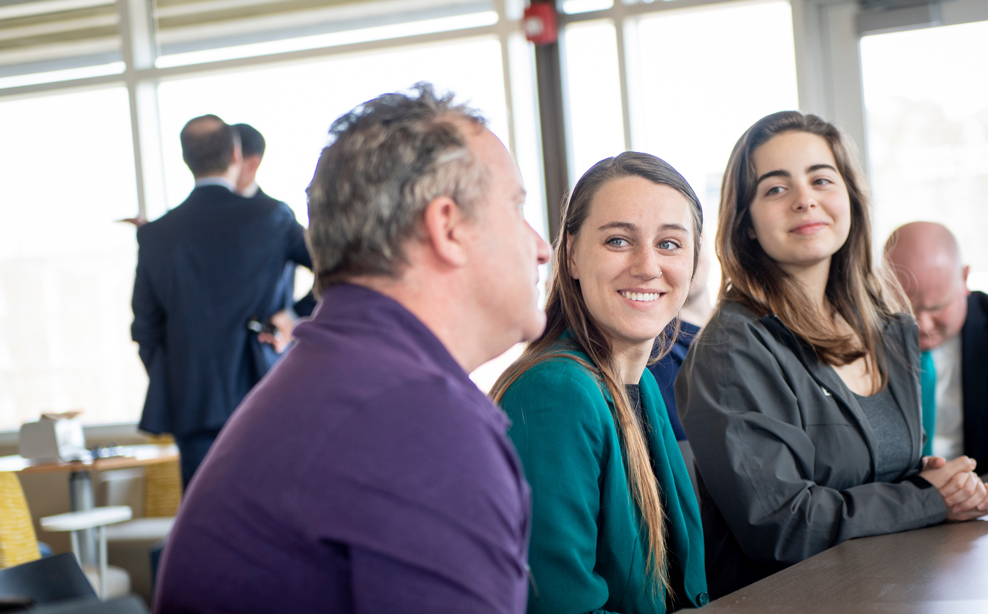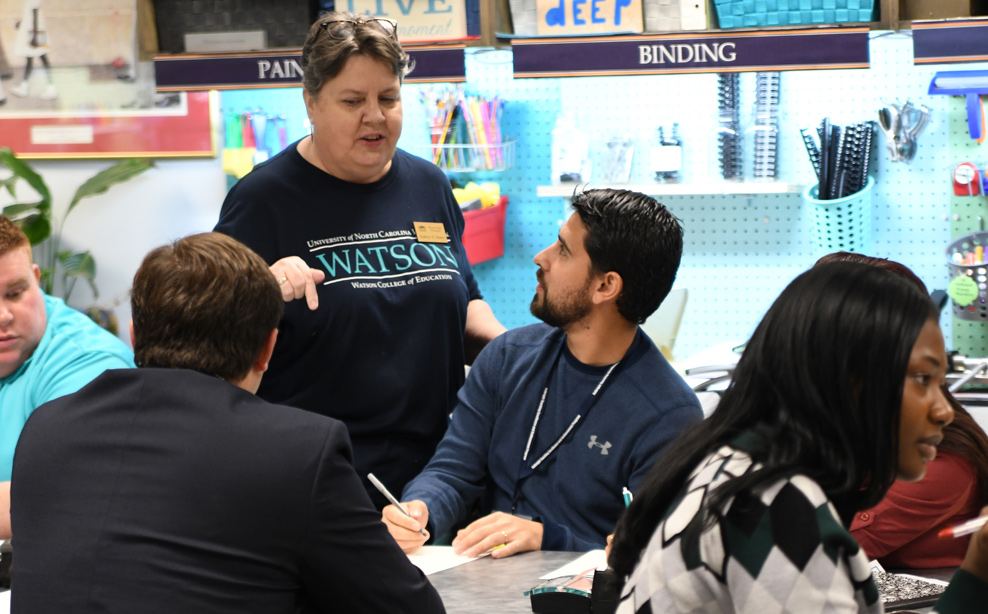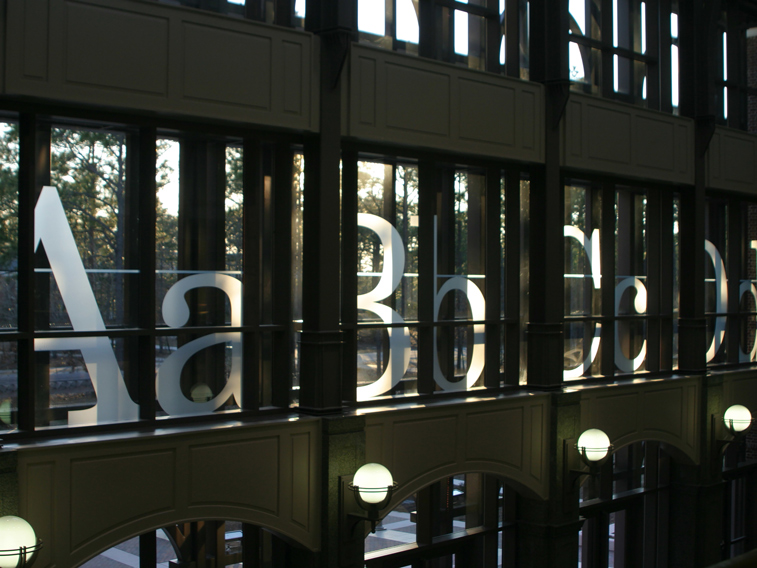Meet Our Leadership Team
Tracy Linderholm joined the University of North Carolina Wilmington as Dean of the Watson College of Education in June 2024. As Dean, she oversees Watson’s academic programs of study, grounded in a strong commitment to field and clinically based professional experiences, and the College’s engagement centers and partnership initiatives whose work extends across eastern North Carolina.
Dr. Linderholm has more than 24 years of experience as an educator, administrator and leader. She most recently served as Associate Dean of the College of Education at Georgia Southern University where her many responsibilities included graduate education, recruitment and enrollment management, faculty affairs, research and scholarship, grants and contracts, marketing, communications and budget oversight.
While at Georgia Southern, Dr. Linderholm introduced initiatives that led to a significant increase in graduate student enrollments; brought the Call Me MISTER program to GSU’s College of Education to attract underrepresented individuals to the teaching profession; and co-led a campus-wide initiative to develop research impact areas, gaining consensus on priority areas of focus for scholarly work highlighted to constituents as part of the University’s identity. As Associate Dean, she demonstrated a strong commitment to PreK-12 partnerships and community engagement, and a passion for supporting students, faculty and staff.
Dr. Linderholm began her career in higher education at the University of Minnesota, where she was a Guy Bond Reading Research Fellow in the College of Education, and a NIH National Research Service Fellow for the Center for Cognitive Services, while enrolled as a doctoral student. She later joined the faculty at the University of Florida where she served as Associate Director for the School of Human Development and Organizational Studies in Education, and Program Director of the Educational Psychology doctoral program.
Dr. Linderholm holds a doctoral degree in Educational Psychology from the University of Minnesota, Minneapolis. She also achieved a Master of Arts in Psychology from California State University Sacramento, and a Bachelor of Science in Journalism from the University of Kansas.
Faculty and staff representing Watson’s two offices, three departments and many centers and engagement initiatives serve alongside the Dean on a team that provides leadership and direction for the work of the College.
- Dr. Tracy Linderholm, Dean
- Ms. Natalie Quinones, Executive Assistant to the Dean
- Dr. Heddy Clark, Director, STEM Learning Cooperative and Interim Director, CESTEM
- Vacant, Director of Technology
- Dr. Keryn Vickers, Director of Student Success Center
- Dr. Kevin McClure, Department Chair, Educational Leadership (EL)
- Dr. Amy Moody, Department Chair of Information, Technology, Foundations and Secondary Education (ITFSE)
- Dr. Martin Wasserberg, Department Chair of Early Childhood, Elementary, Middle, Literacy and Special Education (EEMLS)
- Dr. Heidi Higgins, Associate Dean for Teacher Preparation, Assessment, and Accreditation
- Dr. Symphony Oxendine, Associate Dean for Graduate Education, Professional Programs, Research and Faculty Affairs
- Ms. Somer Lewis, Assistant Dean of Partnerships and Engagement and Director of the Betty Holden Stike Ed Lab
- Mr. Keith Westcott, Assistant Dean for Administration and Resource Management.
| Ms. Kristine Adams | Senior Web Developer | adamsk@uncw.edu | 910-962-3363 |
|---|---|---|---|
| Dr. Julie Bacak | Assistant Professor | bacakj@uncw.edu | 910-962-4171 |
| Ms. Jocelyn Bahhouth | Associate Director for Institutional Assessment | bahhouthj@uncw.edu | 910-962-2543 |
| Dr. Daisyane Barreto | Associate Professor | barretod@uncw.edu | 910-962-7600 |
| Dr. Traci Bellas | Lecturer | bellast@uncw.edu | 910-962-3633 |
| Ms. Lori Best | NC New Teacher Support Lead Instructional Coach |
bestl@uncw.edu | 910-962-7281 |
| Dr. Sarah Bonner | Assistant Professor | bonners@uncw.edu | 910-962-2648 |
| Dr. Patience Brooks | Lecturer | brooksp@uncw.edu | 910-962-4171 |
| Ms. Jan Caffie | Academic Advisor | caffiej@uncw.edu | 910-962-7348 |
| Dr. Jes Cardenas | Assistant Professor | cardenasj@uncw.edu | 910-962-2919 |
| Ms. Amy Carroll | Data Analyst Specialist | carrollag@uncw.edu | 910-962-4017 |
| Ms. Frances Carter | Isaac Bear Early College Coordinator | carterf@uncw.edu | 910-962-2095 |
| Ms. Misty Cayton | PDS Program Associate | caytonm@uncw.edu | 910-962-4173 |
| Dr. Alex Chambers | Assistant Professor | chambersa@uncw.edu | 910-962-0614 |
| Ms. Kimberly Cheatham | Academic Advisor | cheathamk@uncw.edu | 910-962-7357 |
| Dr. Heddy Clark | Director of STEM LC | clarkhk@uncw.edu | 910-962-3639 |
| Ms. Kimberly Cockrell | MarineQuest, Budget Manager | cockrellk@uncw.edu | 910-962-3971 |
| Ms. Amber Colon | Educational Technology Specialist | colona@uncw.edu | 910-962-0518 |
| Dr. Sheri Conklin | Assistant Professor | conklins@uncw.edu | 910-962-7952 |
| Dr. Elizabeth Crawford | Associate Professor | crawforde@uncw.edu | 910-962-2916 |
| Dr. Donna DeGennaro | Associate Professor | degennarod@uncw.edu | 910-962-7551 |
| Dr. James DeVita | Associate Professor | devitaj@uncw.edu | 910-962-3953 |
| Dr. Satlaj Dighe | Assistant Professor | dighes@uncw.edu | 910-962-2128 |
| Dr. Amy Garrett Dikkers | Professor | garrettdikkersa@uncw.edu | 910-962-2915 |
| Ms. Susan Finley | Public Communications Specialist | finleys@uncw.edu | 910-962-2672 |
| Ms. Nicole Geczi | Alternative Licensure Support and Placements Coordinator | geczin@uncw.edu | 910-962-3561 |
| Ms. Josie Gefrich | Ed Lab Coach | gefrichj@uncw.edu | 910-962-3633 |
| Ms. Gianna Geiss | Administrative Associate | geissg@uncw.edu | 910-962-3287 |
| Dr. David Gill | Associate Professor | gilld@uncw.edu | 910-962-4293 |
| Ms. Stephanie Glowa | Assistant Director of Professional Experiences | glowas@uncw.edu | 910-962-3086 |
| Dr. Crystalyn Goodnight | Associate Professor | schnorrc@uncw.edu | 910-962-2658 |
| Ms. Jelene Grace | Academic Advisor | gracej@uncw.edu | 910-962-2291 |
| Ms. Rachel Greer | NC New Teacher Support Program Instructional Coach | greerr@uncw.edu | 910-962-7281 |
| Ms. Maggie Guggenheimer | Senior Lecturer | guggenheimerm@uncw.edu | 910-962-2416 |
| Ms. Michelle Hafey | Program Associate, CESTEM | hafeym@uncw.edu | 910-962-3168 |
| Dr. Tracy Hargrove | Professor | hargrovet@uncw.edu | 910-962-7395 |
| Ms. Avianne Harris | Instructional Designer | harrisan@uncw.edu | 910-962-5980 |
| Mr. Dean Heath | Recruitment & Enrollment Management Specialist | heatht@uncw.edu | 910-962-3087 |
| Dr. Denise Henning | Director of Community College Collaborative | henningd@uncw.edu | 910-962-0568 |
| Ms. Jodi Hebert | DC Virgo Operations Coordinator and Liaison | hebertj@uncw.edu | 910-251-6150 |
| Dr. Heidi Higgins | Associate Dean for Teacher Preparation, Assessment, and Accreditation | higginsh@uncw.edu | 910-962-2199 |
| Dr. Jeremy Hilburn | Associate Professor | hilburnj@uncw.edu | 910-962-2897 |
| Dr. Angela Housand | Associate Dean of Academic Affairs, Program Support, & Student Success (APS), Associate Professor | housanda@uncw.edu | 910-962-3361 |
| Dr. Travis Howard | Assistant Professor | howardt@uncw.edu | |
| Ms. Laurie Howell | Administrative Associate | howelll@uncw.edu | 910-962-4171 |
| Ms. Lisa Hunt | Business Officer | huntl@uncw.edu | 910-962-3179 |
| Dr. Chuck Jurich | Associate Professor | jurichc@uncw.edu | 910-962-7201 |
| Dr. Hengameh Kermani | Associate Professor | kermanih@uncw.edu | 910-962-4182 |
| Ms. Jennifer Knight | Assistant Director, Professional Development System | knightjh@uncw.edu | 910-962-4246 |
| Dr. Martin Kozloff | Distinguished Professor | kozloffm@uncw.edu | 910-962-7286 |
| Dr. Dennis Kubasko | Associate Professor | kubaskod@uncw.edu | 910-962-7817 |
| Dr. Megan Kybartas | Assistant Professor | ||
| Ms. Diane Lane | Business Officer | laned@uncw.edu | 910-962-4172 |
| Dr. Lou LaNunziata | Associate Professor | lanunziatal@uncw.edu | 910-962-3368 |
| Ms. Trang Le | Executive Assistant | let@uncw.edu | 910-962-7101 |
| Ms. Somer Lewis | Assistant Dean of Partnerships and Engagement and Director of the Betty Holden Stike Ed Lab | lewiss@uncw.edu | 910-962-7244 |
| Dr. Christine Liao | Associate Professor | liaoc@uncw.edu | 910-962-3556 |
| Dr. Tracy Linderholm | Dean | linderhomt@uncw.edu | 910-962-3354 |
| Dr. Yan Liu | Assistant Professor | liuy@uncw.edu | 910-962-3883 |
| Dr. Julia Lynch | Visiting Assistant Professor | lynchj@uncw.edu | 910-962-3786 |
| Mr. Joshua Malinowski | Administrative Associate | malinowskij@uncw.edu | 910-962-3192 |
| Dr. Larissa Malone | Associate Professor | malonel@uncw.edu | 910-962-7314 |
| Mr. Dar Mayweather | Lecturer | mayweatherd@uncw.edu | 910-962-7592 |
| Dr. Kevin McClure | Associate Professor, Department Chair, Educational Leadership | mcclurek@uncw.edu | 910-962-7819 |
| Mr. Michael McGuire | Digital Classroom Network Administrator | mcguirem@uncw.edu | 910-962-3041 |
| Ms. Logan McKnight | Licensure and Internship Coordinator | mcknightl@uncw.edu | 910-962-2796 |
| Ms. Tonia McKoy | CMC Specialist | mckoyt@uncw.edu | 910-962-2856 |
| Dr. Carol McNulty | Associate Professor | mcnultycp@uncw.edu | 910-962-3653 |
| Dr. Meredith Moates | Lecturer | moatesm@uncw.edu | |
| Dr. Amelia Moody | Department Chair of ITFSE, Professor | moodya@uncw.edu | 910-962-2580 |
| Ms. Erin Moran | Director, MarineQuest Summer Camp Programs | morane@uncw.edu | 910-962-2992 |
| Ms. Wendy Moran | Administrative Associate | moranw@uncw.edu | 910-962-3913 |
| Dr. Shelby Morge | Professor | morges@uncw.edu | 910-962-7501 |
| Dr. Michael Morrow | Assistant Professor | morrowm@uncw.edu | |
| Dr. Sara Movahedazarhouligh | Assistant Professor | movahedazarhoulighs@uncw.edu | 910-962-0613 |
| Mr. Harris Mulhstein | MarineQuest School Programs Coordinator | muhlsteinh@uncw.edu | 910-962-2640 |
| Ms. Ann Nations | Administrative Associate | nationsa@uncw.edu | 910-962-4001 |
| Ms. Morgan O'Connell | MarineQuest Program Assistant | oconnellm@uncw.edu | 910-962-2992 |
| Mr. Chris O'Conner | MarineQuest PreK-12 Coastal Engineering Associate | oconnerc@uncw.edu | 910-962-7783 |
| Ms. Melissa Ogle | NC New Teacher Support Coach | oglem@uncw.edu | |
| Ms. Kim Orick | Administrative Associate | orickk@uncw.edu | 910-962-7539 |
| Dr. Denise Ousley-Exum | Associate Professor | ousleyd@uncw.edu | 910-962-7175 |
| Dr. Symphony Oxendine | Associate Professor, Associate Dean for Graduate Education, Professional Programs, Research and Faculty Affairs | oxendines@uncw.edu | 910-962-3430 |
| Dr. Jennifer Park | Assistant Professor | parkjj@uncw.edu | 910-962-2483 |
| Dr. Eleni Pappamihiel | Professor | pappamihieln@uncw.edu | 910-962-2746 |
| Dr. Michele Parker | Professor | parkerma@uncw.edu | 910-962-2292 |
| Dr. Raymond Pastore | Professor | pastorer@uncw.edu | 910-962-2912 |
| Dr. Tracy Pena | Technology Liaison | penat@uncw.edu | 910-962-7615 |
| Ms. Andrea Perrone | Lecturer | perronea@uncw.edu | 910-962-3961 |
| Ms. Phyllis Pierce | Administrative Associate | piercep@uncw.edu | 910-962-3040 |
| Mr. Brian Powell | Technology Support Analyst | powelleb@uncw.edu | 910-962-4357 |
| Mr. Ellis Pressley-Whitman | Business Service Coordinator | pressleywhitmane@uncw.edu | 910-962-2573 |
| Ms. Natalie Quinones | Executive Assistant | luceron@uncw.edu | 910-962-3354 |
| Dr. Angelia Reid-Griffin | Professor | reidgriffina@uncw.edu | 910-962-7176 |
| Dr. Sharon Richter | Associate Professor | richtersm@uncw.edu | 910-962-3507 |
| Dr. Jessica Rivenbark | Assessment Data Analyst | rivenbarkj@uncw.edu | 910-962-7115 |
| Ms. Tonnia Rodriguez | Field Experience Coordinator | rodriguezt@uncw.edu | 910-962-3360 |
| Dr. Kathleen Roney | Professor | roneyk@uncw.edu | 910-962-7195 |
| Dr. Donyell Roseboro | Professor | roseborod@uncw.edu | 910-962-3283 |
| Dr. Caitlin Ryan | Professor | ryanc@uncw.edu | |
| Dr. Andrew Ryder | Associate Professor | rydera@uncw.edu | 910-962-7318 |
| Dr. Shawn Savage | Assistant Professor | savages@uncw.edu | 910-962-3460 |
| Dr. Kathleen Schlichting | Associate Professor | schlichtingk@uncw.edu | 910-962-7786 |
| Dr. Amy Senta | Associate Professor | sentaa@uncw.edu | 910-962-2851 |
| Dr. Samantha Silberstein | Visiting Assistant Professor | silbersteins@uncw.edu | 910-962-6221 |
| Dr. Lynn Sikma | Associate Professor | sikmal@uncw.edu | 910-962-7287 |
| Dr. Crystal Simmons | Associate Professor | simmonscg@uncw.edu | 910-962-2912 |
| Dr. Robert Smith | Professor | smithrw@uncw.edu | 910-962-4076 |
| Ms. Shawn Sproatt | Executive Assistant | sproatts@uncw.edu | 910-962-3096 |
| Dr. Dana Stachowiak | Director of Women’s Studies and Resource Center, Associate Professor | stachowiakd@uncw.edu | 910-962-7806 |
| Mr. Stephen Stephan | MarineQuest Kayak Instructor | stephans@uncw.edu | |
| Dr. James Stocker | Associate Professor | stockerj@uncw.edu | 910-962-2739 |
| Dr. Laura Szech | Associate Professor | szechl@uncw.edu | 910-962-3651 |
| Dr. Amy Taylor | Professor | taylorar@uncw.edu | 910-962-2673 |
| Dr. Candace Thompson | Associate Professor | thompsonc@uncw.edu | 910-962-4174 |
| Ms. Courtney Townsend | Ed Lab Coach | townsendc@uncw.edu | 910-962-7645 |
| Dr. Keryn Vickers | Director, WCE Student Success Center | vickersk@uncw.edu | 910-962-3912 |
| Dr. Tamara Walser | Professor | walsert@uncw.edu | 910-962-4175 |
| Dr. Cara Ward | Assistant Professor | wardcf@uncw.edu | 910-962-3366 |
| Dr. Martin Wasserberg | Associate Professor, Department Chair of EEMLS | wasserbergm@uncw.edu | 910-962-2917 |
| Mr. Randall Wells | Lecturer | wellsra@uncw.edu | |
| Mr. Ryan Wennerlind | Lecturer | wennderlindk@uncw.edu | 910-962-3624 |
| Mr. Keith Westcott | Assistant Dean for Administration and Resource Management. | westcottk@uncw.edu | 910-962-2740 |
| Ms. Shenicka Williams | Lead Coach, Curriculum Materials Center | williamssaa@uncw.edu | 910-962-3362 |
Emeritus Faculty
| Dr. James Applefield | Associate Professor Emeritus |
| Dr. Cathy Barlow | Professor Emeritus |
| Dr. Paz Bartolome | Professor Emeritus |
| Dr. William A. Bryan | Professor Emeritus |
| Dr. Calvin Doss | Professor Emeritus |
| Dr. Kathy Fox | Professor Emeritus |
| Dr. Tracy Hargrove | Professor Emeritus |
| Dr. Andrew Hayes | Professor Emeritus |
| Dr. Hathia A. Hayes | Professor Emeritus |
| Dr. Barbara Honchell | Associate Professor Emeritus |
| Dr. Richard Huber | Professor Emeritus |
| Dr. Linda Mechling | Professor Emeritus |
| Dr. Catherine Nesbit | Professor Emeritus |
| Dr. Ann Potts | Associate Professor Emeritus |
| Dr. Debbie Powell | Associate Professor Emeritus |
| Dr. Janna Robertson | Professor Emeritus |
| Dr. Robert Smith | Professor Emeritus |
| Dr. Marcee Steele | Professor Emeritus |
| Dr. Carol Chase Thomas | Professor Emeritus |
| Dr. Robert E. Tyndall | Professor Emeritus |
| Dr. Karen Wetherill | Professor Emeritus |
| Dr. Brad Walker | Associate Professor Emeritus |
| Dr. Eleanor Wright | Professor Emeritus |
Representatives from local schools, businesses and the broader community serve in a reciprocal capacity on the Community Advisory Council, bringing new perspectives to our work, and helping to inform the community and region about the work of the College.
Community Advisory Council Members
- Rachel Bodkin-Fox, Community Member
- Jennifer Booher, New Hanover County Schools
- Dawn Carter, UNCW - University Advancement
- Michael Cobb, Cape Fear Community College
- Travis Corpening, New Hanover County - Office of Diversity and Equity
- Bo Dean, New Hanover County - Human Resources
- Bill Fields, Chase Commercial Banking
- Susan Finley, UNCW - Watson College of Education
- Linsey Honaker, Monteith Co.
- Jennie Jackson, Bank of America
- Jerry Jackson, The 100 Black Men of Coastal North Carolina Inc.
- Wanda Marino, Community Member
- Dawn Martin, New Hanover County Schools
- Kimberly McLaughlin-Smith, UNCW Diversity and Inclusion - Human Resources
- Deloris Rhodes, Community Member
- Edelmira Segovia, UNCW - Centro Hispano
- Sheila Sokolinsky, New Hanover County Schools
Advancement Council members promote and support the Watson College through attendance at events, a philanthropic commitment and outreach to others with philanthropic interest and the capacity to make an impact through charitable giving.
Advancement Council Members
- Wilma Daniels
- Bo Dean
- Brian Etheridge '95
- Susan Rabon
- Margaret Robison
- Angie Shoff
- Ellen Wells '69
- Jan Wessell '83
- Acquenetta Wheeler
WCE Mission Statement
The mission of the Watson College of Education is to develop knowledgeable and proficient education professionals dedicated to improving schools and society. We address this mission by:
- Providing academically rigorous programs;
- Producing and using meaningful scholarship;
- Partnering with schools, organizations and diverse communities;
- Advancing the profession.
Value Statements
Decades of educational research demonstrate that outstanding education professionals must know their content, know how to effectively engage learners and assess learning, and embrace and enact appropriate dispositions and values (Darling-Hammond, 2010; Goodlad, 1990; Shulman, 1987). Our mission, which guides the work of our faculty and staff in preparing education professionals, is predicated on the following set of values:
Advocacy
Advocacy to improve schools and society is an obligation of education professionals.
Advocacy requires us to act on behalf of individuals and groups and to address social concerns. To do this work, we use professional knowledge and skills and exercise value judgments to determine what we should advocate. Advocacy is dependent on our communicative methods; it is tied to relevant life experiences; and it often forces us to work "outside of our comfort zones" (Newman & Bauer, 2005). Advocacy is active; it connects thought to action. It implies that we operate with certain beliefs and attitudes that will influence social and educational change (Mundy & Murphy, 2001).
Diversity
Recognizing and utilizing the value of difference is a requisite to maximize human development.
Our society is diverse in culture, language, race, ethnicity, gender, religion, social class, sexual identity, ability, age, and ideology. Diversity strongly influences who we are, how we learn, and how we teach. Freire (1997) argues that teachers are cultural workers, with a responsibility to identify their own socio-cultural positions and to recognize those of their students. He adds that responsibility should be conceived of as our "ability to respond." We strive to respond appropriately to difference, to recognize how socio-cultural positions affect teaching, and to draw upon the value of difference to create meaningful learning experiences.
Ethics
Education professionals must uphold ethical standards to ensure just and respectful educational practices.
High-quality education, that is, education that positively nurtures intellectual, emotional and social growth, must also include a consideration of what is right and wrong and the influence of time and context on such conceptions. Ethical attitudes and dispositions are shaped by moral perspectives and those perspectives help to determine ethical behaviors (Como, 2011; Purtillo, 2005). We find two ethical theories particularly relevant: an ethic of justice (which represents egalitarian beliefs and behaviors) and an ethic of care (which represents being responsive and trusting). Both of these theories allow us to connect personal issues with larger structural ones such that we can examine the system of education with respect to individual rights, collective responsibility, and institutional governance (Noddings, 2010).
Global Perspectives
Understanding global perspectives and practices inspires connections to erase the boundaries that divide us.
Education must be viewed as global in nature, grounded in an understanding of teaching and learning as interdependent, tied to issues of human rights and global citizenship, and that works toward creating sustainable processes that govern what we do (Peters, 2009). Global education is not just about examining people, cultures, and technologies. It is fundamentally about looking inward to study ourselves, our interactions, our systems, and our products. In this way, it allows for deep and broad reflection in intrapersonal and interpersonal ways.
Innovation
Generating and adopting innovations is imperative to meet the changing needs of society.
In education, the mark of innovation is its ability to transform (Giannakaki, 2005). This process usually involves five steps: to consider the innovation; to develop an opinion about its possibilities; to decide to use or not; to employ the new idea; and to determine that the innovation was indeed an appropriate one (Rogers, 1984). Innovation needs to be viewed as a continual process of creativity and regeneration in light of the rapidly changing nature of the world in which we live.
Inquiry
A lifelong attitude of inquiry is at the core of transformative education.
Inquiry is grounded in our ability to question, to investigate, to explore, and to problem-solve. It requires an ability to reflect and can lead us to innovate. Johnston (2009) applied Dewey's theory of inquiry to education and argued that inquiry is context-bound, problem-driven, and self-correcting. In short, inquiry can operate differently depending on the context or discipline; it depends on the study of a particular problem or question; and it unifies, that is, it moves from a focus on discriminate parts to a reconstituted whole. Johnston (2009) points out that "all inquiry is transformative" (p. 8), which suggests that inquiry can serve as a catalyst for personal and social change.
Nurturing
Development of nurturing environments is essential for growth, positive relationships and new ideas.
When we nurture, we care for, attend to, and believe in an individual, group, organization, idea, or process. Nurturing depends on the establishment of relationships of trust and facilitates social, emotional and intellectual growth (Binnie & Allen, 2008). It is organic, contingent upon context and invariably different when shaped by those contexts. Nurturing environments are vital for academic learning, personal growth, positive relationships and reimagined practices and structures.
Reflection
Continual reflection is critical for learning, growth and change.
Reflecting represents thoughtful consideration, an attunement to a moment, idea, interaction, circumstance, and/or process. Dewey (1910) described reflection as a condition that involves "mental unrest" (p. 13). It allows us to re-constitute information such that we reconstruct or reinterpret the meaning of an experience (Clark, 2009; Rodgers, 2002; Schon, 1986). In the act of reflecting, we become better practitioners, able to identify what we do well and what needs improvement and, from there, to make appropriate change.
Adopted October 24, 2012
References
- Binnie, L. M. & Allen, K. (2008). Whole school support for vulnerable children: The evaluation of a part-time nurture group. Emotional & Behavioral Difficulties 13(3), 201-216. doi:10.1080/13632750802253202
- Clark, P. G. (2009). Reflecting on reflection in interprofessional education: Implications for theory and practice. Journal of Interprofessional Care 23(3), 213-223.
- Como, J. (2011). Care and caring: A look at history, ethics, and theory. International Journal for Human Caring 11(4), 37-45.
- Darling-Hammond, L. (2010). The flat world and education: How America's commitment to equity will determine our future. New York: Teachers College Press.
- Dewey, J. (1910). How we think: Boston: D. C. Heath.
- Freire, P. (1997). Teachers as cultural workers: Letters to those who dare teach. Boulder, CO: Westview Press.
- Giannakaki, M. S. (2005). The implementation of innovation in school. In A. Kapsalis (Ed.). Management and administration of schools (pp. 243-276). Thesseloniki: University of Makedonia Press.
- Goodlad, J. (1990). Teachers for our nation's schools. San Francisco: Jossey-Bass. Johnston, J. S. (2009). Deweyan inquiry: From education theory to practice. Albany: State University of New York Press.
- Mundy, K. & Murphy, L. (2001). Transnational advocacy, global civil society? Emerging evidence from the field of education. Comparative Education Review 45(1), 85-126).
- Newman, W. & Bauer, V. (2005). Incitement to advocate: Advocacy education of future librarians of University of Toronto's faculty of information studies. Feliciter 51(1), 41- 43.
- Noddings, N. (2010). Moral education in an age of globalization. Educational Philosophy & Theory 42(4), 390-396.
- Peters, L. (2009). Global education: Using technology to bring the world to your students. Eugene, OR: International Society for Technology in Education.
- Purtillo, R. (2005). Ethical dimensions in the health professions (4th ed.). Philadelphia: Elevier.
- Rodgers, C. (2002). Defining reflection: Another look at John Dewey and reflective thinking. Teachers College Record 104, 842-866.
- Rogers, E. M. (1984). Diffusion of innovation (2nd ed.). New York: Free Press.
- Schon, D. (1986). Educating the reflective practitioner. San Francisco: Jossey-Bass.
- Shulman, L. (1987). Knowledge and teaching: Foundations of the new reform. Harvard Educational Review, 57 (1), 1-22.



